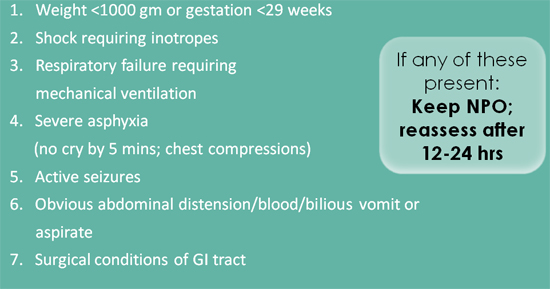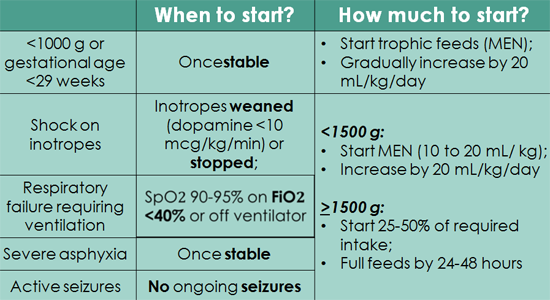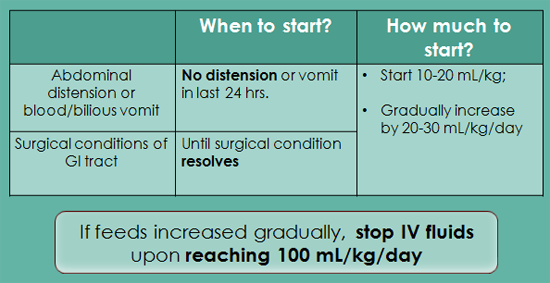When to initiate feeds and how much to feed LBW infants?
Dear friends, in this webinar we shall learn when to initiate feeds and how much to feed in LBW infants
All LBW infants should be started on full enteral feeds immediately after birth; for outborn neonates, full feeds should be started at admission. Enteral feeds may be in the form of direct breastfeeding, expressed breast milk, or formula (in rare cases). There are only a few exceptions in whom full oral feeds are NOT started at birth or admission.
They include weight <1000 g or gestation <29 weeks; shock requiring inotropes; respiratory failure requiring invasive mechanical ventilation; severe asphyxia defined as no cry by 5 min or need for chest compressions; active and ongoing seizures; obvious abdominal distension with or without blood/bile-stained aspirate or vomiting; and finally, surgical conditions of GI tract like intestinal atresia. If any of these conditions are present, we have to keep the baby nil per oral, and reassess after 12-24 hours.
Upon reassessment, we should check if the baby is stable, i.e. maintaining normal temp, HR, RR, saturations and capillary refill time with or without support. If stable, we can start oral feeds. For babies <1000 g, we usually start with MEN - minimal enteral nutrition or trophic feeds; This means giving expressed breast milk at 10 to 20 ml/kg/day for 1-2 days and then gradually increasing by 20 ml/kg/day. In other conditions such as respiratory failure, shock, asphyxia, or seizures, we can be little more aggressive we can start at 25 to 50% of required daily intake; if the baby accepts this well, gradually increase to full feeds in the next 24-48 hours. If the baby is <1500 g, start MEN and then gradually increase feeds by 20 ml/kg/d. In babies with abdominal distension or surgical conditions of gastrointestinal tract, we can start feeds if there is no abdominal distension or vomiting in the last 24 hours and the abdomen is soft. In these babies, we usually start feeds at 10-20 ml/kg/d and increase gradually by 20 to 30 ml/kg/day. In all the babies in whom feeds are started slowly, we have to assess if the baby is tolerating feeds by careful inspection of the abdomen before each feed. We shall learn about monitoring of feed intolerance in a separate webinar.
If feeds are increased gradually, the baby has to be kept on IV fluids till the baby reaches 100 ml/kg/d of feeds after which we can stop IV fluids. The daily requirement of fluids in LBW babies is provided in this table.
For babies with BW of 1500 g or more, we start at 60 ml/kg on day 1 of life. We increase the amount by 20 ml/kg every day till the baby reaches 160 ml/kg by day 7. In VLBW babies, we usually start at 80 ml/kg on day 1 of life. The amount is increased by 15 ml/kg every day till the baby reaches 150 ml/kg by day 7. Feeds should be given every 2-3 hours in all LBW babies.
- Introduction...
- 1. When to initiat...
- 2. In which infant...
- 3. When to initiat...
- 4. When to initiat...
- 5. How much to fee...
 |
 |
Introduction
DR. M JEEVA SANKAR
MD, DM (Neonatology)
Assistant Professor
Department of Pediatrics
All India Institute of Medical Sciences
New Delhi
1. When to initiate feeds?
► All LBW infants
♦ Start full enteral feeds at admission or birth
except in some infants
2. In which infant/ clinical condition can feeds not be started?
Exceptions

3. When to initiate feeds?
Exceptions

4. When to initiate feeds? - 01
Exceptions

5. How much to feed?


